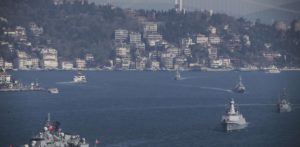
Large naval exercises and intense propaganda efforts that accompanies them are designed to help Turkey shape a political-military environment that will allow it to defend its rights and interests in surrounding seas.
The Turkish Navy carried out its largest ever exercises, dubbed Blue Homeland, this Spring, with 103 ships in the Black, Aegean and Mediterranean seas. That was followed in September by another drill, Determination, in the eastern Mediterranean, where Turkey has been involved in a long-running dispute over energy rights.
Military exercises are still used effectively to project power and act as a deterrent against rivals, as NATO’s giant Trident Juncture and Russia’s 1000-aircraft and 36,000-tank VOSTOK drill showed last year.
Turkey has had success with this approach in the past. A good example of this came in 1987, when Greece contravened a 1976 agreement with Turkey to begin energy exploration in the north Aegean, bringing the countries to the brink of war.
The crisis was averted by a flurry of diplomatic contacts that included interventions by top U.S. and NATO officials. But the talks were underpinned by a show of force Turkey made by sending its warships to conduct military exercises in the sea. Turkey had demonstrated clearly that it would not hesitate to use force if necessary.
Turkey sees the current situation in the eastern Mediterranean as another contravention of its rights and interests since Cyprus’s exclusive economic zone overlaps with its own claim to areas on its continental shelf. It says drilling by Cyprus and its international partners ignores the rights of the breakaway Turkish Republic of Northern Cyprus.
Turkey’s ability to impose itself in the area though has been limited by perceptions held at home and abroad about the weakness of its military after the July 15, 2016 coup attempt, which led to the dismissal or prosecution of many officers suspected of links to the religious movement blamed for plotting to overthrow the government.
Turkey is also isolated in its regional quest for hydrocarbons, while its rivals Egypt, Israel and Greece have united in the Eastern Mediterranean Gas Forum with the encouragement of the United States and inclusion of energy giants like ExxonMobil.
Left with little choice but to assert itself, Turkey chose a show of force with the naval drills this year.
The flood of news stories and social media posts that accompanied the exercises were persuasive enough to dispel domestic fears that the post-coup purges had weakened the navy.
However, they have clearly missed their mark as a deterrent measure. Conditions have not changed in the eastern Mediterranean in spite of the two drills, and part of the block granted by Cyprus last month to two European energy companies – Italy’s Eni and France’s Total – included an area that Turkey says is part of its continental shelf.
A key point is that Turkey is now facing several competitors at once. During earlier crises, Greece was the only country Turkey had to address, whereas now it is dealing with the United States, Israel, Egypt, Cyprus, Russia, the EU, and energy firms ExxonMobil, Total and Eni.
Many of these actors are closely cooperating through mechanisms like the Eastern Mediterranean Gas Forum. Strategies that have worked against a single opponent will not necessarily work against a coalition, or in a more complex political dynamic.
Countries closely follow each other’s military activities. Military exercises provide important data on a country’s capabilities, doctrines, morale and preparedness for war.
Although strategic communication activities play a significant role in delivering messages to counterparts during exercises, the most important issue in terms of deterrence and coercion is as an exhibition of firepower, the ability to launch attacks from the sea, air-sea cooperation and joint operations in a way that can be thoroughly understood by the opposite side.
One of the best recent examples came in 2017, when Russian warships launched missiles at ISIS targets in Syria from the Caspian Sea, 1,500 km away.
Turkey’s two naval drills this year were not as effective. In terms of power projection, they were not significantly different to previous drills, with the exception that this year ground forces’ attack helicopters and amphibious elements participated in the Aegean Sea.
But the current dispute is playing out in the eastern Mediterranean, and centres on energy wrangling over energy resources. Transferring amphibious naval power to areas near Cyprus under the joint protection of naval and air force elements would have been a bolder move, and military exercises including a simulated attack on oil and gas platforms would clearly demonstrate Turkey’s resolve.
In any case, Ankara’s attempts at coercive diplomacy have so far failed in the eastern Mediterranean, and the options ahead of it are limited.
One possibility would be more naval drills. Every year, Turkey plans Toros and Barbaros military exercises in response to the Nikiforos and Toksotis exercises planned by Greece and Cyprus. The current convention is that both sides cancel the drills each year as a show of mutual goodwill.
Ankara could well choose to go through with the next round of drills, a move that would further raise tensions and would reflect the view that the current efforts have led to deadlock.
Meanwhile, Greece has been holding back from direct involvement in the crisis, despite having its own claims in the eastern Mediterranean due to the islands of Rhodes, Karpathos, Kasot and Kastelorizo.
Athens seems to wish to allow Turkey to remain in the limelight in the belief that aggression in the eastern Mediterranean would lead to a loss of legitimacy in the eyes of the international public.
Turkey may choose to address this by focusing more military action in areas near the Greek islands, drawing Athens into the crisis as a direct actor.
https://ahvalnews.com/eastern-mediterranean/turkish-naval-drills-ineffective-against-united-east-med-competitors




